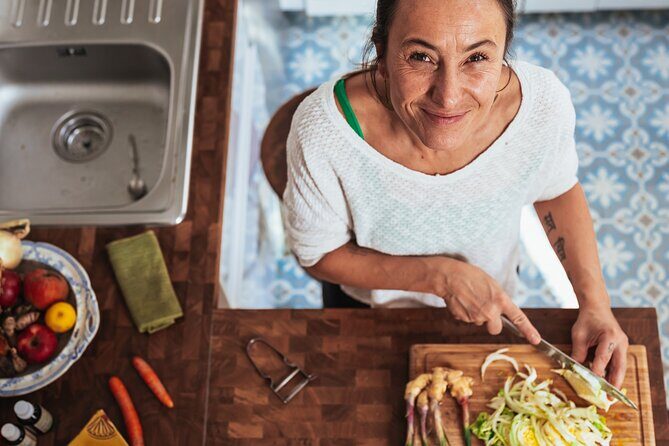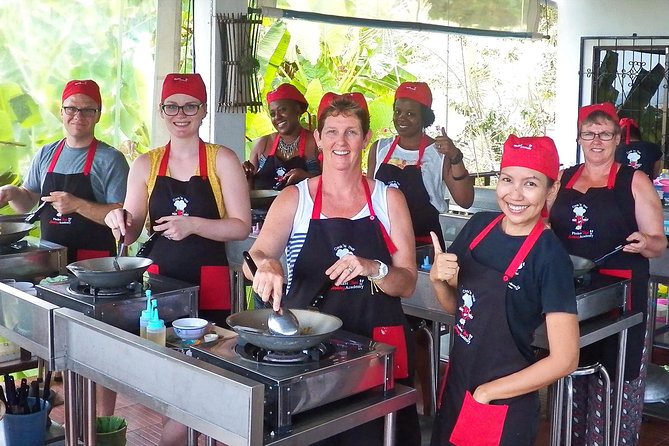Discover the flavors and secrets of Indian cuisine with Indian Traditional Hands-on Cooking Classes With Local Family.
In this immersive experience, participants actively engage in the preparation of traditional dishes while learning about the cultural significance behind each recipe.
Under the guidance of a local family, guests gain valuable culinary skills and a deeper understanding of India’s rich heritage.
Whether you’re a seasoned chef or a passionate food lover, this unique opportunity allows you to indulge in the vibrant flavors of India and create lasting memories through the art of cooking.
Key Takeaways

- Indian cuisine reflects the country’s diverse traditions, customs, and rituals.
- Traditional cooking techniques preserve the authenticity of Indian dishes.
- Each region in India has its own unique cooking techniques and flavor profiles.
- Families in every region of India cherish their secret recipes, passing them down through generations.
History of Indian Cuisine: Exploring the Roots of Traditional Cooking Methods

The discussion on the history of Indian cuisine explores the roots of traditional cooking methods, shedding light on the evolution of flavors and techniques.
Exploring the culinary heritage of India reveals the cultural significance of Indian cuisine, which goes beyond just food. Indian cuisine is a reflection of the country’s diverse traditions, customs, and rituals. It’s deeply intertwined with the social fabric of the nation, serving as a means of connection and celebration.
The history of Indian cuisine can be traced back thousands of years, with influences from various invaders, traders, and migrants. Each region in India has its own unique cooking techniques and flavor profiles, showcasing the rich diversity of the country. From the elaborate spices used in North Indian cuisine to the coconut-based dishes of South India, Indian cuisine is a testament to the country’s vibrant heritage and culinary traditions.
Ingredients and Spices Used in Indian Cooking: Discovering the Key Flavors

He explores the key flavors of Indian cooking by experimenting with various ingredients and spices.
Indian cooking techniques: mastering the art of spice blending,
Traditional Indian beverages: exploring the world of flavorful drinks.
Indian cuisine is renowned for its rich and diverse flavors, which are achieved through a careful combination of ingredients and spices. From the fiery heat of chili peppers to the aromatic sweetness of cardamom, each flavor plays a crucial role in creating a truly authentic Indian dish.
By experimenting with different ingredients and spices, our culinary explorer delves into the heart of Indian cooking, uncovering the secrets of spice blending. Through this exploration, he learns how to balance the flavors and create harmonious combinations that tantalize the taste buds.
Plus, he delves into the world of traditional Indian beverages, discovering the refreshing and flavorful drinks that are an integral part of Indian culture. From the cooling lassi to the aromatic chai, each sip transports him to the vibrant streets of India, where these beverages are enjoyed daily.
Join him on this culinary journey as he uncovers the key flavors of Indian cooking and unlocks the secrets to mastering this ancient culinary art.
Traditional Cooking Techniques: Hands-On Experience in the Kitchen
She enjoys learning traditional cooking techniques through hands-on experience in the kitchen.
From kneading dough for bread to grinding spices for curries, she finds joy in immersing herself in the cultural significance of cooking.
Traditional cooking techniques not only preserve the authenticity of a dish but also carry the stories and traditions of generations past. Through her hands-on experience, she learns the importance of patience and precision in creating flavors that have stood the test of time.
Traditional cooking techniques bring people together, fostering a sense of community and celebration. The act of cooking becomes a way to connect with one’s roots and honor the heritage of a particular cuisine.
As she continues her culinary journey, she cherishes the knowledge gained from these traditional cooking techniques and the cultural significance they hold.
Regional Specialties: Exploring the Diverse Culinary Traditions of India

One can discover over 30 unique regional specialties across India, each showcasing the diverse culinary traditions of the country. From the spicy curries of the south to the rich biryanis of the north, Indian cuisine offers a journey through the flavors of the different regions. Exploring the cultural significance of Indian cuisine allows one to understand the deep connection between food and heritage.
The flavors of each region tell a story: From the coconut-infused dishes of Kerala to the aromatic spices of Punjab, every bite reflects the history, climate, and geography of the area.
Traditional cooking techniques are passed down through generations: In each region, families have their own secret recipes and methods that have been perfected over time.
The use of local ingredients is essential: The availability of ingredients influences the flavors and dishes of each region, resulting in a unique culinary experience.
Embarking on a culinary journey through India allows one to not only savor the delicious dishes but also gain a deeper appreciation for the country’s rich culture and heritage.
Family Recipes Passed Down Through Generations: Unveiling Secret Family Treasures

Exploring the culinary heritage of India, families in every region have cherished their secret recipes, passing them down through generations and unveiling these treasured family treasures. These cooking traditions not only showcase the diverse flavors and techniques found in Indian cuisine, but also serve as a way for families to connect with their roots and preserve their cultural heritage.
From the spicy curries of the north to the flavorful biryanis of the south, each region has its own unique culinary traditions that have been perfected and refined over time. These family recipes often include a combination of aromatic spices, fresh ingredients, and traditional cooking methods that have been handed down from one generation to the next.
Vegetarian and Vegan Options: Embracing the Richness of Plant-Based Indian Cuisine

The cooking class offers a variety of vegetarian and vegan options, allowing participants to embrace the richness of plant-based Indian cuisine. With a focus on vegan cooking techniques, the class provides a unique opportunity to learn how to create delicious and nutritious meals without the use of animal products.
Participants will discover the health benefits of Indian cuisine, which is known for its use of spices and herbs that aren’t only flavorful but also have medicinal properties. The class emphasizes the importance of using fresh and locally sourced ingredients, ensuring that the dishes aren’t only healthy but also environmentally sustainable.
From creamy curries to aromatic rice dishes, you will learn how to create authentic Indian flavors using plant-based ingredients. Whether you’re a seasoned vegan or just looking to incorporate more plant-based meals into your diet, this cooking class is a great way to explore the diverse and delicious world of Indian cuisine.
Traditional Indian Desserts: Indulging in Sweet Delights
Often overlooked, traditional Indian desserts offer a tantalizing array of sweet delights that can be enjoyed by all. These delectable treats not only satisfy the taste buds but also hold great cultural significance. Indian desserts, known as mithai, are an integral part of Indian cuisine and are often prepared for special occasions and festivals. They showcase the diversity and richness of Indian culture, with each region having its own unique desserts. From the creamy and aromatic Gulab Jamun to the crispy and syrup-soaked Jalebi, Indian desserts are a true indulgence. They are made using various ingredients like milk, nuts, ghee, and aromatic spices, resulting in flavors that are rich, sweet, and fragrant. The table below showcases some popular Indian desserts and their cultural significance:
| Dessert | Cultural Significance |
|---|---|
| Gulab Jamun | Symbolizes love and celebration |
| Rasgulla | Represents purity and devotion |
| Kheer | Associated with prosperity and good fortune |
| Barfi | Signifies joy and happiness |
| Laddu | Symbol of good luck and new beginnings |
These desserts not only bring joy to the palates of those who indulge in them but also serve as a reminder of the cultural heritage and traditions of India. So, next time you have a chance, don’t miss out on experiencing the delightful world of traditional Indian desserts.
Frequently Asked Questions
How Do I Book a Hands-On Cooking Class With a Local Indian Family?
To book a hands-on cooking class with a local Indian family, one can find them by searching online or contacting local tourism agencies. The cost of such classes can vary depending on the family and the duration of the class.
What Is the Duration of the Indian Traditional Hands-On Cooking Classes?
The duration of the cooking classes varies depending on the specific program, but participants can expect to learn a variety of traditional Indian cooking techniques during their hands-on experience with a local family.
Are Ingredients and Cooking Equipment Provided During the Cooking Classes?
Yes, ingredients and cooking equipment are provided during the cooking classes. They ensure participants have everything they need to learn and experience the recipe variations and understand the cultural significance of the ingredients.
Can Participants Customize the Dishes They Learn to Cook During the Classes?
Participants can customize the dishes they learn to cook during the classes, adding their own unique touch to traditional recipes. This allows for a personalized experience while still honoring the cultural significance of the cuisine.
Is There a Minimum Age Requirement for Participating in the Indian Traditional Hands-On Cooking Classes?
The minimum age requirement for participating in the cooking classes is 10 years old. It is recommended for participants within the suitable age range of 10 and above to fully enjoy and engage in the hands-on cooking experience.
The Sum Up
To sum it up, Indian Traditional Hands-on Cooking Classes With Local Family offers a unique and immersive culinary experience. Participants not only learn the art of Indian cooking but also gain a deeper understanding of the cultural heritage and traditions of India. With a hands-on approach and personalized guidance from a local family, guests can expect an authentic and unforgettable experience. Whether you’re a seasoned chef or a passionate food lover, this opportunity allows you to indulge in the flavors of India and create lasting memories through the art of cooking.
These pages offer similar hands-on cooking classes and culinary experiences in different locations:
- Khmer Cooking Class at a Local’s Home in Krong Siem Reap: Enjoy the Khmer cuisine of Cambodia with this cooking class at a local’s home in Krong Siem Reap. Learn traditional recipes and techniques while experiencing the warmth and hospitality of a local family.
- 5 Traditional Dishes: Hanoi Cooking Class with Market Trip: Discover the vibrant flavors of Hanoi, Vietnam, through a cooking class that includes a market trip. Learn how to prepare five traditional dishes and gain insight into the local ingredients and culinary traditions.
- Half-day Cooking Class in Thamel, Kathmandu: Experience the rich flavors of Nepalese cuisine with a half-day cooking class in Thamel, Kathmandu. Learn traditional recipes and cooking techniques while exploring the local market for fresh ingredients.
These links provide additional options for those interested in exploring different cooking classes and culinary experiences in various destinations. Feel free to click on them to discover more about these exciting opportunities.






